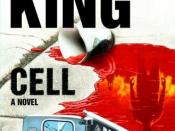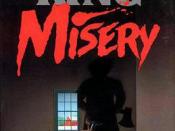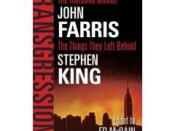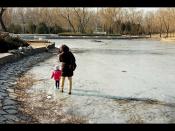Isn't it always great when in apocalyptic movies and when perhaps ninety-nine out of a hundred people die, the survivors are always portrayed with an immense hope of building a greater and better world? We see the somehow-knows-how-to-fly-a-jet president of the united states standing on the podium delivering some supposed-to-be-spirit-lifting speech at the end of ID4 in front of the nearly destroyed white house. We also see at the end of another blockbuster The Day After Tomorrow that the disruption of the old world order seems to have promised an thrilling future where the snobbish U.S. government is totally at mercy of the countries that are labeled "the third world'. (The scene that sees hundreds and thousands of U.S. refugees trying to flee their land of freedom and venture down south to Mexico has been most entertaining)But what is it like when basically half, no, nine-tenths of the world is destroyed and you suddenly realized⦠guess what, now you gotta rebuild the world! So, you're facing a server lack of food, no electricity, no tap water, no nice shower in the morning after a night of crazy partying, no laptops and frappucino with whipped cream on top and basically, no life! And still you have to rebuild the world.
This is not all. There would probably be tons of looters and self-appointed gangs who'd kill for a better chance to survive. Yes, welcome to the jungle. Imagine you were someone who survived the terminator's Judgment Day caused by Skynet, or that you lived on a weird flying shuttle constantly chased and assaulted by some weird gigantic electronic squid. Don't you just wish that you had died along with the others or perhaps that the world had been destroyed once and for all and hence the pains and sufferings?So maybe, just maybe, the people that make it through the end of the world described in H. G. well's short fiction The Star, do not exactly feel a sense of rebirth. They probably don't see the immense hope and the promise of a new better world in front of them. Well, let's get realistic (and cynical) what's left are probably ruined cities, countless scattered dead bodies swarmed with maggots and flies, a severe lack of food, collapsed social order, and not to mention possible cannibalism driven by long time famine.
Maybe the experiment of the Martians is not after all to see what the comet would do to the earth - assuming that the event is really caused by the martians. Maybe what they really want to know is actually what we homo sapiens would do in times of despair. Perhaps there were anthropologists behind those astronomers. Well, you never know.
It's said that science fictions reveal contemporary issues. As Stephen King's novel The Mist shows how people would easily turn to blind faith in times of crisis and depicts the forming of a Christianity based cult surrounding a crazily religious woman and their attempt to appease the wrath of god by killing the sinned, perhaps the delineation of a post-apocalyptic scenario will reveal a lot more about us than the recount of the happening of the apocalypse itself. Probably someone someday will write a story about the psychological portrait of the despair, fear, hatred, and desperation of the people who survive the Armageddon and in the end commit collective suicide. Now that would be really cool.
Bibliography"The Star" (Zvezda), 2002, directed by Nikolai Lebedev







